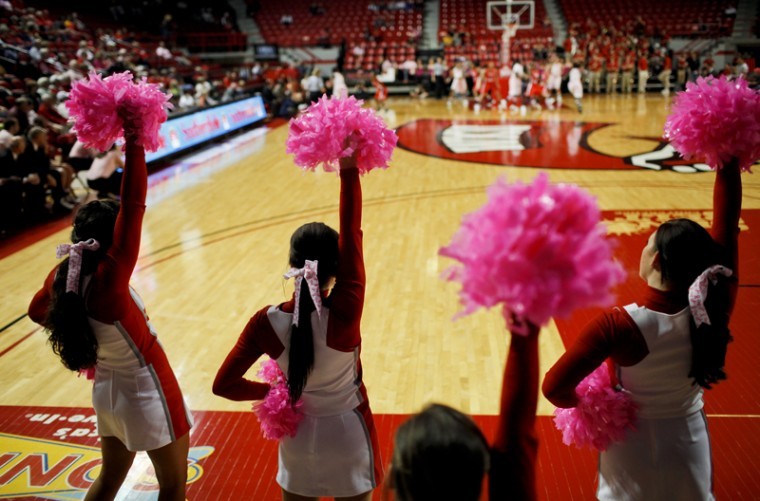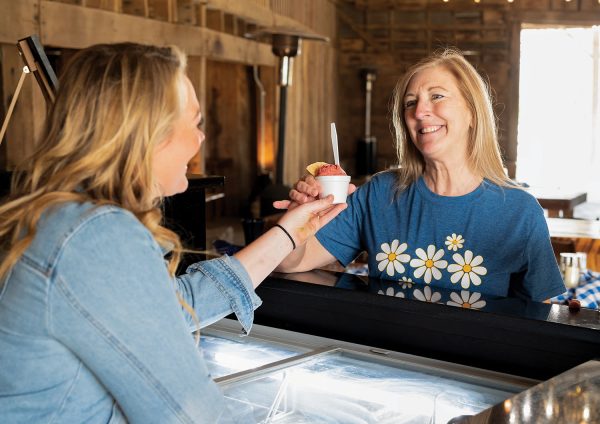WKU Cheerleaders stand against breast cancer
February 7, 2012
Saturday’s WKU women’s basketball game wasn’t about red and white. Instead, the color of the day was pink – for breast cancer awareness.
Players and fans alike donned pink to show their support for the cause. Even the All Girls Cheer Team traded out their usual red-and-white pompoms for fuchsia.
For the cheerleaders, this game was personal. Breast cancer had touched the life of one of their own.
Last May, WKU All Girls Cheer Assistant Coach Joni Hall was diagnosed with stage one breast cancer. After preliminary tests last March, Hall said she knew something was wrong when the doctors weren’t telling her the whole story.
When she finally received the news, Hall said she was ready to take on the disease.
“I said, ‘Let’s go. Let’s fight,'” she said.
In fact, Hall scheduled her surgery for the very next day. A wife and mother of twin teenage boys, Hall knew she couldn’t waste any time. She said she also wanted to attend her cheerleading squad’s try-outs in a few weeks.
Once plans were made, Hall called Josh Bewley, the head coach of the WKU All Girls Cheer Team. Bewley told the girls on the squad.
WKU Junior Lani Kuegel, an Exercise Science major from Owensboro who has been on the squad for three years, said she was concerned about her coach.
“We took it hard,” Kuegel said. “But she was positive, not like most people would be.”
After Bewley broke the news to the squad, Hall said the squad reached out to her with phone calls and Facebook messages.
By late July 2011, Hall was in the midst of treatments. Yet she was still keeping up with the squad’s activities as much as she could. She was even able to attend part of the camp held by both the all girls and co-ed squads of the Topper cheerleaders.
When she arrived at the camp, Hall found both squads ready to greet her in pink T-shirts Bewley and Tom Jones, the head coach, had made as a tribute to her.
“It was a sea of pink,” Hall said.
The support shown from the cheerleaders, along with her family’s strength helped her to keep fighting, she said.
In September 2011, doctors told Hall she was officially in remission. Although she will continue taking a low-dose form of chemotherapy for the next five years and will see an oncologist every four months, Hall said she’s confident she’ll stay positive no matter what happens.
In the mean time, Hall and the Topper cheerleaders are working to raise awareness for breast cancer.
During October, the All Girls squad participated in a flash mob in Dillard’s department store in Greenwood Mall. The cheerleaders danced to Michael Jackson’s “Beat It” to collect donations for the Susan G. Komen for the Cure foundation.
Jones said this isn’t the first time the WKU cheerleading squads have helped raise awareness and money for disease research.
“We try to get out in the public eye,” he said.
Jones said this includes participating in events such as the Alzheimer’s walk in September and “Relay For Life.”
Bewley tells his squad that they’re representatives of WKU for the surrounding community.
“First and foremost, they’re ambassadors for the university,” he said.
Hall wanted to use the squad’s position to show support for breast cancer awareness. She said she vowed to buy the team pink pompoms while she was lying in a hospital bed during her treatments last year.
“I’m a fighter,” Hall said. “And I’m a planner.”
Kacey Shepherd, a Murfreesboro, Tenn., freshman on the All Girls squad, said she was happy to use the new props at the game.
Hall said she tells her squad to make sure they get regular breast exams.
“Especially if you have any history in your family,” she said. “You can’t play.”
Shepherd said she’s also looking forward to doing more to raise awareness in the future.
“We’re so close to someone who has had it,” Shepherd said. “It impacts a lot of people.”




















![Megan Inman of Tennessee cries after embracing Drag performer and transgender advocate Jasmine St. James at the 9th Annual WKU Housing and Residence Life Drag Show at Knicely Conference Center on April 4, 2024. “[The community] was so warm and welcoming when I came out, if it wasn’t for the queens I wouldn’t be here,” Inman said.](https://wkuherald.com/wp-content/uploads/2024/04/smith_von_drag_3-600x419.jpg)





